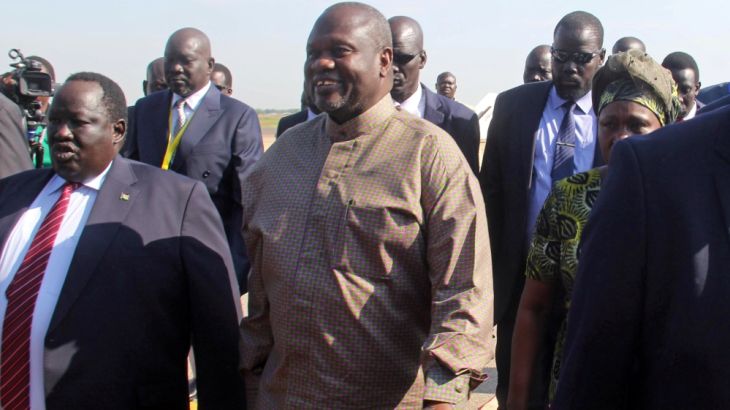South Sudan rebel leader Machar back in Juba after two years
Ex-vice president Riek Machar returned for the first time since 2016 to take part in a peace ceremony.

South Sudan rebel leader and former vice president, Riek Machar, has returned to the capital, Juba, more than two years after he fled the country after the collapse of a 2016 peace deal.
He returned on Wednesday to take part in a peace ceremony.
Keep reading
list of 4 itemsSouth Sudan: President Kiir, VP Machar agree to resume talks
South Sudan’s Riek Machar, wife test positive for coronavirus
Will South Sudan’s latest peace deal last?
Machar fled to neighbouring Democratic Republic of Congo in 2016. He later travelled to South Africa, where he was held under house arrest until earlier this year.
Last month, he and President Salva Kiir signed a new peace deal in Ethiopia in the latest attempt to end the five-year civil war that erupted in the world’s youngest country in December 2013.
On Wednesday, Kiir said Machar’s imprisoned South African adviser, William Endley, and a rebel group spokesman, James Gatdet, would be released on Thursday as part of the peace deal.
Endley will be deported to South Africa upon release, Kiir said.
Machar’s previous homecoming in April 2016 was put off by wrangling over how many bodyguards he could bring with him and what weapons they would carry.
Safety concerns
It was not immediately clear how long Machar would remain in Juba, as his aides have expressed concerns over his safety in the city.
“We are worried for his security in Juba, but the truth is here: we are for peace, and what we are trying to do is build trust,” Gabriel said.
Several thousand people have gathered for the ceremony at the John Garang Mausoleum, built in honour of the independence hero who was killed in a helicopter crash in 2005.
Among regional leaders in Juba for the ceremony were Sudanese President Omar al-Bashir, Ethiopia’s newly appointed President Sahle-Work Zewde and Somalia’s head of state Mohamed Abdullahi Mohamed.
Ugandan President Yoweri Museveni was also expected to attend.
Humanitarian crisis
South Sudan gained independence from its northern neighbour Sudan in 2011 after a 22-year civil war pitting rebel groups against Khartoum.
Two years later, the country descended into civil war after Kiir accused his then-deputy, Machar, of plotting a coup.
Ethnically-charged fighting soon spread from the capital across the impoverished state, shutting down oil fields, forcing millions to flee and killing tens of thousands of people.
The conflict split the country along ethnic lines and has seen mass rape, the forced recruitment of child soldiers and attacks on civilians.
It has caused one of the world’s greatest humanitarian crises and wrecked the economy in a country which relies on oil production for the vast bulk of its revenues.
A power-sharing deal that returned Machar to the vice presidency was signed in 2015. But it collapsed a year later in a deadly battle that saw Machar flee into exile.
The United Nations and the African Union earlier this month appealed to the country’s warring parties to make concrete steps to implement the latest accord.